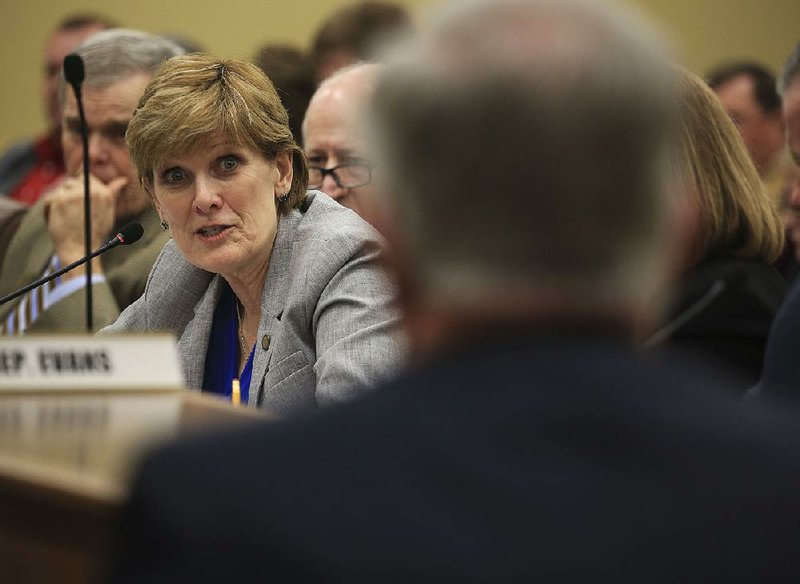A proposal to use $3 million in state income tax dollars to send mostly low-income students to private schools died in a House committee on Thursday.
After opponents raised concerns about private- school accountability and more than 90 minutes of debate, the House Education Committee voted 11-7 against Senate Bill 539 by Sen. Blake Johnson, R-Corning.
Seven Republicans and four Democrats voted against the bill.
The legislation, which the Senate approved last week, would create a dollar-for-dollar tax credit for individual and corporate income taxpayers who make donations to registered nonprofits.
The educational charities would use those funds to create about 400 private-school vouchers for students from low-income families, foster children, military families and students with disabilities.
Public school groups and administrators have been the most vocal critics of SB539, focusing on accountability.
"To me, if state money is tied to it -- even though we've said donations, there's these tax credits -- it's just my belief that accountability for that school should be the same as the public schools," Jacksonville North Pulaski School District Superintendent Bryan Duffie told the committee. "But if [families] make that choice to go to a private school, if they're paying, then it's not my concern."
[RELATED: Complete Democrat-Gazette coverage of the Arkansas Legislature]
The Arkansas Tax Credit Scholarship program proposed by SB539 would be capped at $3 million annually. Both the tax credits and private-school vouchers would be available on a first-come, first-served basis.
The credits could be used to offset some or all of the income tax due in a given year for the contributing taxpayers, according to the Department of Finance and Administration. Unused credits could be carried forward up to five years.
The vouchers would be available to students from families making no more than 150 percent of the amount that qualifies a student for federal school lunch assistance ($71,456 for a family of four next school year when the proposed tax-credit system would have gone into effect).
Students from military families, foster children and students with disabilities also would qualify for the program.
The scholarships could equal the state's base school-funding rate, calculated on a per-student basis, which is $6,781 this school year.
Rep. Ken Bragg, R-Sheridan, the House sponsor of SB539, told the committee that the bill contained the appropriate accountability measures.
It would have required private schools to meet accreditation requirements or be in the accreditation process before the state Board of Education, the Arkansas Nonpublic School Accrediting Association Inc. or another accrediting association recognized by the state.
The bill also would require the student support nonprofits to submit annual reports on student achievement, graduation rates, parent satisfaction and spending.
"Just because you don't report directly to the [Arkansas Department of Education] doesn't mean there's no accountability," Bragg said.
Bragg's legislation would have created Arkansas' most expansive private school choice program. The Succeed Scholarship Program already awards private school scholarships to about 250 students who have disabilities.
SB539 was one of two school choice bills introduced by Bragg and Johnson this session. The other, Senate Bill 620, proposed creating a $3.5 million pilot voucher program for low-income children in Pulaski County.
Gov. Asa Hutchinson said he supported both bills, although he preferred SB620, which has not been heard in committee.
"It's clear from the vote in the House Education Committee that the Legislature is not ready for a pilot program, such as this scholarship bill," Hutchinson said in a Thursday statement. "I'm sure this issue will come up again in future sessions of the legislature, but I do not anticipate any additional effort this session."
Bragg said SB539 was about expanding education opportunities beyond the wealthiest families. He said after Thursday's hearing that he didn't plan to bring the bill back for another vote this session.
"School choice isn't really the issue here; we have school choice," Bragg said. "The issue is the opportunity to exercise that school choice."
Dale Query, executive director of the Arkansas Rural Education Association, cautioned committee members that SB539 would be a misstep.
There's a nationwide movement to undermine public schools and promote legislation similar to SB539 led by wealthy individuals with an agenda, he said.
"This is intentional to create private, for-profit schools," Query said. "That's what the whole movement is all about. This seemingly innocuous bill -- 400 kids, three million bucks -- is just the beginning."
Rep. Mark Lowery, R-Maumelle, took issue with Query's characterization of philanthropists who want to help children receive the best possible education.
"It could be argued that this is just a pebble thrown into the ocean, but it's a start," Lowery said.
Rep. Jana Della Rosa, R-Rogers, opposed SB539, and she disagreed with Lowery's assessment.
"This is not philanthropy," she said. "Philanthropy is when you give your own money to someone else. This isn't giving your own money to someone else. This is giving the state's money to someone else."
This is the second consecutive legislative session in which a bill proposing to use a $3 million pot of tax-advantaged contributions to fund private school scholarships has failed in the session's final days.
A Section on 04/05/2019

